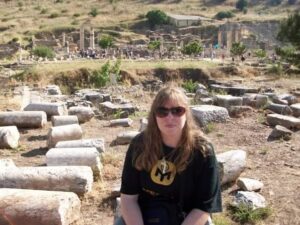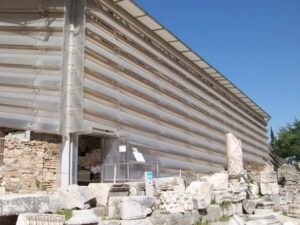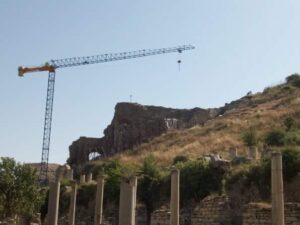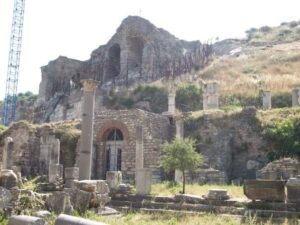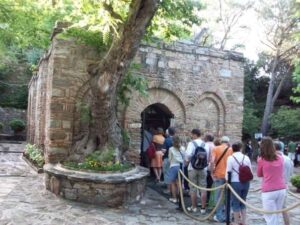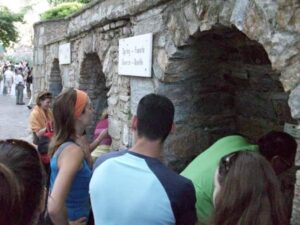Debbie Adams Gullet is a fascinating and very talented lady. She is an RN, a history fanatic, a lover of Science, a martial arts student, a ghost chaser, an animal lover, a world traveler, and a collector of weapons and antiques. I first met her on a group tour to Scotland in 2018, on which I was a featured music performer. Somehow we started a conversation about history and she shared some information on an archaeology trip to Turkey she had participated in. Some photos of her trip are included at the end of this post. In response to my questions for an interview, here is what she said.
- (Have you always been interested in history and archaeology? Do you subscribe to any archaeological journals/magazines? Biblical Archaeological Review? Have you taken any classes or studied any subjects that were helpful?) I have loved history and archeology since I was a little girl finding arrowheads in creeks and fields. Western Civilization was one of my favorite college subjects. I have subscribed to Biblical Archeology Review and Archeology Magazine, but now I mainly just read online. I’m a Registered Nurse by trade but have an extensive home library that includes history, anthropology, and archeology.
- (Where did you go in Turkey? Were you with a group? How many were in the group? Did you work with more than one site? Does Turkey have many strict rules?) I visited Turkey on a Mediterranean tour with a group via Explorica. They do educational tours all over the world. I was lucky enough to know someone that got me into the dig sites in Ephesus. They were excavating a gladiator cemetery and a huge amphitheater. I was a glorified dirt hauler!
- (How did you find out about this trip? What is the typical day like for participants on a trip like this?) I found this trip through some friends, I had never known about Explorica. They’re a great company for educational tours. My typical day started early, breakfast, then we would shuttle to the site for work till dinner, then made time for some sightseeing.
- (Did you make new friends on this trip? Who stood out among those you worked with?) I have made some great friends on these trips and keep up with many of them. Some of us have traveled together on several trips.
- (What important things did you learn from this experience? Did you find or bring back any relics? Did others find anything?) It’s illegal to take any artifacts from a site. You can buy some in shops but be very wary of fakes, these fake relics are big business. We were mainly digging up architectural items like columns or structural stones. There were bins in the warehouse of things that hadn’t been worked through yet.
- (Did you visit any museums, churches, or ruins? Anything Bible related? What was the most beautiful/memorable site you saw? Did you return with a list of things you wanted to study further?) I was able to visit museums and ruins in Athens, Delphi, Santorini, Knossos on Crete, and other islands. Ephesus has a wonderful museum. I explored Patmos and the cave where the Book of Revelation, written by John the Elder in about 96 AD. He was exiled from Ephesus after preaching there by the Roman Emperor Domitian and his anti-Christian rule. There was a beautiful monastery with loads of artifacts on display there too. I also visited Meryamana Evi, a shrine where legend says Mary Magdalene was cared for by St John after they fled the Crucifixion. It was amazing to walk where these people once walked. Very humbling. The most engaging and beautiful site I saw was the ruins of the Library of Celsus in Ephesus. I can just imagine all the stacks of scrolls. Cleopatra even studied there. I always leave a site with more questions when I leave. It makes for some great research and reading!
- (If someone would like to take a similar trip/tour/expedition, what advice would you give them? What should they expect? What is the estimated financial cost? How can they prepare for the hard work? What clothing should they pack?) If anyone is interested in educational trips abroad, I suggest they check out Explorica, Road Scholar or others on the web. These are safe convenient ways to travel and learn. Be prepared to do much walking and be ready for rough terrain and heat/cold. Overseas does not make everything accessible like we do in the US. There are stairs, hills, and rocks. I usually plan for $5-7,000 for my trips but there are ways to cut costs depending on lodging, dining, etc. It’s well worth the cost to me to explore our world and our past.
